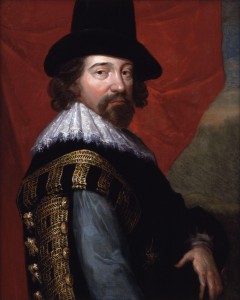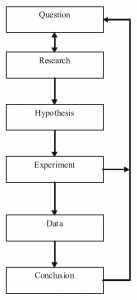Sir Francis Bacon

by Unknown Author, used under ![]()
Was born on January 1561. He served as both Lord Chancellor of England and the Attorney General. He is regarded as a philosopher, scientist, author, the father of the Scientific (Baconian) method, and creator of empiricism. Sir Francis Bacon was dedicated to his work and his experiments. Being regarded as the creator of empiricism, he believed that true knowledge was gained through sensory experiences. With this in mind, Sir Francis Bacon’s death was a testament to his dedication to knowledge and his work. In April 1626, he died after catching pneumonia while studying the effects of freezing preservation of meat. His most famous work is the Novum Organum “new instrument” (known as the new instrument of science) and was published in 1620. This work is in reference to Artistotle’s work, Organon. While this work addresses many points in dealing with gaining factual knowledge, the main premise is the scientific method or Baconian method that Sir Francis Bacon proposed. Novum Organum explains the development of the scientific method which we now see today.

by John P. McCaskey, used under 
“Earlier scientists had thought of observation and experiment as demonstrating a conclusion anticipated by systematic deductive reasoning, or as determining a detail or filling in a gap, as required to extend an existing theory …,“ (Bacon, 2000, p. XV). As you can see, there was this existing idea of how experiments and knowledge was to be gained. Focusing more on elaborating on existing theories rather than contemplating on the theories themselves. Sir Francis Bacon goes on to explain his theory for experiments.
“Bacon, by contrast, regarded observation and experiment – particularly experiments designed to test how nature would behave under previously unobserved circumstances – as the very foundation of science and its generalized methodology. He expected that the process itself of organizing the mass of data collected into natural and experimental histories would lead to an entirely new and largely unforeseen scientific theory,” (Bacon, 2000, p. XV). He believed in testing the experiments first hand in order to gain true knowledge of what was being observed. He emphasized the importance of observation and experimentation. Below is an explanation of what exactly Bacon’s scientific method consisted of.
“Now my method, though hard to practice, is easy to explain; and it is this. I propose to establish progressive stages of certainty. The evidence of the sense, helped and guarded by a certain process of correction, I retain. But the mental operation which follows the act of sense I for the most part reject; and instead of it I open and lay out a new and certain path for the mind to proceed in, starting directly from the simple sensuous perception,” (Bacon, The New Organon or True Directions Concerning the Interpretation of Nature, 1620, p. 1). In simplified terms, Bacon suggests that new way of conducting research should be as follows:

by Erik Ong, used under ![]()
1. Ask a question
2. Do background research
3. Construct a hypothesis
4. Conduct an experiment
5. Analyze your data and draw a conclusion
6. Report your results
Bacon also believed that in order to learn more about something, such as the body, one had to experience it firsthand. Through sensory experiences, true knowledge was gained. This is explained through the idea of empiricism, which Bacon is credited with developing (as mentioned above).
Through Bacon’s findings and developments he has changed the way science is conducted in all aspects. Through all fields, even the medical field, Bacon has changed the course for the future of scientific research and developments. This quote shows how Bacon’s research and work can be tied into any aspect of the scientific realm, specifically the medical field.
“To learn about the body requires clinical observation and recording, together with the comparison of bodies, experiments on living animals and attention to pathological changes. The aims of medicine should include not only the restoration of health but also the relief of suffering and they are not to be limited by putting aside a disease as incurable,” (Boss, 1978, p. 1).
The importance of Sir Francis Bacon’s findings is limitless. His results are still affecting the way we conduct scientific results today. By helping to establish a solid scientific method, he has changed the course of the science world we know today. It affects all aspects of scientific research that has come after publishing his results.
Sources:
Bacon, F. (1620). The New Organon or True Directions Concerning the Interpretation of Nature. In F. Bacon, Novum Organum.
Bacon, F. (2000). Francis Bacon: The New Organon. In L. Jardine, & M. Silverthrone, Francis Bacon: The New Organon (p. 252). Cambridge University Press.
Boss, J. (1978, May). The Medical Philosophy of Francis Bacon. Retrieved from Pubmed.gov: http://www.ncbi.nlm.nih.gov/pubmed/353452
Francis Bacon. (c. 1731). [Digital Image]. Retrieved from http://commons.wikimedia.org/wiki/File:Francis_Bacon,_Viscount_St_Alban_from_NPG_%282%29.jpg. Public domain image.
McCaskey, J.P. (1650). Novum Organum. [Digital Image]. Retrieved from http://commons.wikimedia.org/wiki/File:Novum_Organum_1650_crop.jpg. Available under Creative Commons Attribution 3.0.
Ong, E. (2010). The Scientific Method. [Digital Image]. Retrieved from http://commons.wikimedia.org/wiki/File:The_Scientific_Method.png. Available under Creative Commons Attribution-Share Alike 3.0.
Recent Comments